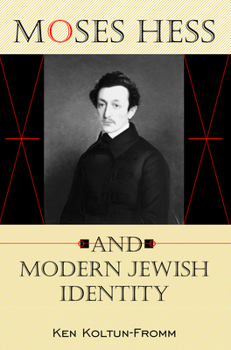Moses Hess and Modern Jewish Identity
(Part of the Jewish Literature and Culture Series)
"Koltun-Fromm's reading of Hess is of crucial import for those who study the construction of self in the modern world as well as for those who are concerned with Hess and his contributions to modern thought. . . . a reading of Hess that is subtle, judicious, insightful, and well supported." --David Ellenson
Moses Hess, a fascinating 19th-century German Jewish intellectual figure, was at times religious and secular, traditional and modern, practical and theoretical, socialist and nationalist. Ken Koltun-Fromm's radical reinterpretation of his writings shows Hess as a Jew struggling with the meaning of conflicting commitments and impulses. Modern readers will realize that in Hess's life, as in their own, these commitments remain fragmented and torn. As contemporary Jews negotiate multiple, often contradictory allegiances in the modern world, Koltun-Fromm argues that Hess's struggle to unite conflicting traditions and frameworks of meaning offers intellectual and practical resources to re-examine the dilemmas of modern Jewish identity. Adopting Charles Taylor's philosophical theory of the self to uncover Hess's various commitments, Koltun-Fromm demonstrates that Hess offers a rich, textured, though deeply conflicted and torn account of the modern Jew. This groundbreaking study in conceptions of identity in modern Jewish texts is a vital contribution to the diverse fields of Jewish intellectual history, philosophy, Zionism, and religious studies.
Jewish Literature and Culture--Alvin H. Rosenfeld, editor
Published with the generous support of the Koret Foundation





